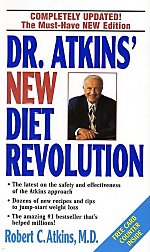Michael Fumento
Factual · Powerful · Original · Iconoclastic
The Atkins Diet Still Doesn't Work
January 01, 2003 · Michael Fumento · Scripps Howard News Service · Overweight and obesityNutritionists have long said that any fad diet can shed weight quickly, but the pounds are soon regained. Now two studies in a prestigious medical journal have caused a media maelstrom. They show that the Atkins regimen can shed weight quickly . . . but the pounds are soon regained.
 Still sells like high-fat hotcakes.
Still doesn’t work.
Still sells like high-fat hotcakes.
Still doesn’t work.
Both studies appeared in the New England Journal of Medicine (NEJM), with each randomly dividing subjects into two groups. In each study, one group was told to reduce caloric intake while the other wasn’t expressly told to cut calories but rather instructed to keep carbohydrate intake extremely low as dictated by the late Dr. Robert Atkins’ books. One, conducted at the Philadelphia Veterans Administration Hospital, lasted six months and comprised subjects with an initial average weight of about 215 pounds. The other, conducted at three different centers, lasted 12 months and comprised subjects with an initial average weight of about 290 pounds.
The six-month study found that Atkins dieters lost weight at about twice the rate as the higher-carb group – for two months. Thereafter neither group lost much weight. By the end of half a year the Atkins dieters, however, had still managed to keep off about twice as much weight as the higher-carb group – for what it was worth. The average loss was a mere 13 pounds from that original 290.
Further, the 12-month study indicates even that was probably a doomed effort. Here again, the Atkins group lost considerably more weight for the first half year. But thereafter not only did it begin packing the pounds back on, it did so faster than the higher-carb group. Ultimately, concluded the researchers, "the differences were not significant at the end one of year."
"The probable explanation" for the early weight loss said the chief researcher of the longer study (Gary Foster of the University of Pennsylvania), is that while most calories in our diets are normally carbohydrates, with Atkins "You’re left eating a lot of fat, and you get tired of that." So the Atkins plan is merely a low-calorie diet in disguise.
Soon though, Atkins dieters become so starved for carbohydrates that they either start cheating or quit the plan altogether. In fact, both studies were plagued by high drop-out rates from all sets of dieters. The only weight-control regimens that work require both eating in moderation and exercise.
The NEJM findings also belie a massively publicized New York Times Magazine cover story last year by Gary Taubes that rocketed Atkins diet book sales into the stratosphere and landed Taubes his own $700,000 book contract.
In the article, Taubes cited five then-unpublished studies claiming: "The results of all five of these studies are remarkably consistent. Subjects on some form of the Atkins diet," he insisted, "lost twice the weight as the subjects on the low-fat, low-calorie diets."
But two of those are the ones discussed here. Somehow, "The differences were not significant at the end of one year" doesn’t seem to support "lost twice the weight."
 "All-you-can-eat so long as it’s low-carb" is a license to gluttony, not a successful method of weight loss.
"All-you-can-eat so long as it’s low-carb" is a license to gluttony, not a successful method of weight loss.
Nevertheless, at least there seemed no evidence that all that saturated fat in the Atkins diet increases the risk of heart disease. In neither study did the Atkins dieters have increased LDL or "bad cholesterol," and the 12-month one even found a small increase in HDL or "good cholesterol." Finally the triglycerides (fatty compounds in blood) of the Atkins dieters decreased. Lower triglyceride levels have been linked to lower rates of heart disease.
But not so fast, says Robert H. Eckel, professor of medicine at the University of Colorado Health Sciences Center in Denver.
Eckel says probably one reason for improved blood readings in the Atkins groups is that at least part of the time they did have greater weight loss. "Generally when people lose weight, both triglycerides and HDL improve," he says.
Indeed, even the higher-carb losers showed some improvement in both measurements.
Further, he says, not all HDL is created equal. Just as we once thought all cholesterol was bad, there is now evidence that some "good" HDL may not be good after all.
Finally, says Eckel, epidemiological studies indicate that triglycerides appear to have only a mild direct impact on heart disease; rather they are a marker for other factors that do impact it.
The Atkins Center was overjoyed that the new studies may indicate the regimen isn’t dangerous. But how peculiar when the most you can say for the best-selling fad diet book of all time is that its recommendations probably don’t kill people.
Read a longer version of this article, Hopeless Fad: Sorry, the Atkins Diet Still Doesn’t Work (National Review Online, June 6, 2003)
